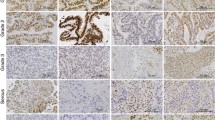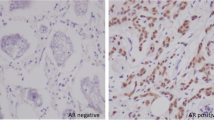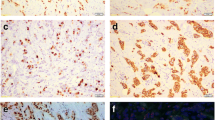Abstract
Background
Endometrial carcinoma (EC) is one of the most common gynecological malignancies and is frequently hormonally driven. Apart from the clinicopathological features, various biomarkers are important for predicting the prognosis, survival, and recurrence of the disease. Estrogen receptor (ER) and progesterone receptor (PR) have been extensively studied. Androgen receptor (AR) expression is correlated with ER and PR, suggesting the role of AR in EC, however, the correlation is less studied in EC.
Objective
This study aimed to assess the expression of AR in EC and to correlate it with ER and PR and with the clinic-pathological parameters of EC.
Methods
Our study included a total of fifty histologically proven cases of EC with twenty controls. AR, ER, and PR expression were evaluated by immunohistochemistry (IHC) in each case and the expression of these biomarkers was correlated with clinicopathological features. AR expression was correlated with ER and PR and relevant statistical analysis was done.
Results
The mean age of the patients was 55.9 years. Among 50 cases of EC, 23(46%) revealed AR expression. The hyperplastic epithelium showed significantly higher expression of the AR, which persisted in low-grade EC, whereas, a loss of expression was noted in high-grade tumors (p value = 0.002). AR expression showed a significant association with the type, grade, and stage of the disease. ER expression was noted in 62% and PR expression in 64% of cases of EC. There was a positive correlation between ER and PR expression with AR expression. Also, most of the cases showing AR positivity had a longer disease-free survival (p value = 0.024).
Conclusion
ER and PR status are important prognostic markers for the prediction of anti-hormonal therapy in EC. AR expression is inversely associated with the grade of EC. Therefore, AR can serve as a biomarker and prognostic indicator and subsequent anti-androgen drugs may be of therapeutic use.





Similar content being viewed by others
References
Mangal S, Sharma M,Manjari M, et al. (2020) Expression of Androgen Receptor, Estrogen Receptor, and PR. In: Endometrial Carcinoma (Immunohistochemical Study) Annals of Pathology and Laboratory Medicine 7(5):A248–252.
Sung H, Ferlay J, Siegel RL, Laversanne M, Soerjomataram I, Jemal A, Bray F. Global cancer statistics 2020: GLOBOCAN estimates of incidence and mortality worldwide for 36 cancers in 185 countries. CA a Cancer J Clinic. 2021;71(3):209–49.
Balasubramaniam G, Sushama S, Rasika B, Mahantshetty U. Hospital-based study of endometrial cancer survival in Mumbai. India Asian Pac J Cancer Prev. 2013;14(2):977–80.
Zadeh SL, Duska LR, Mills AM. ARexpression in endometrial carcinoma. Int J Gynecol Pathol. 2018;37(2):167–73.
Mohapatra K, Shivalingaiah SD. Immunohistochemical expression of ER, PR and HER2/neu in endometrial carcinoma. Indian J Gynecol Oncol. 2019;17:1–9.
Li H, Andres KL, Kraynov EA, Luthin DR, Do QQ, Hong Y, Tompkins E, Sun ET, Rajapakse R, Pathak VP, Christie LC. Discovery of a novel, orally active, small molecule gonadotropin-releasing hormone (GnRH) receptor antagonist. J Med Chem. 2006;49(11):3362–7.
Fioretti FM, Sita-Lumsden A, Bevan CL, Brooke GN. Revising the role of the AR in breast cancer. J Mol Endocrinol. 2014;52:R257-265.
Yang HP, Gonzalez Bosquet J, Li Q, Platz EA, Brinton LA, Sherman ME, Lacey JV Jr, Gaudet MM, Burdette LA, Figueroa JD, et al. Common genetic variation in the sex hormone metabolic pathway and endometrial cancer risk: pathway-based evaluation of candidate genes. Carcinogenesis. 2010;31:827–33.
Lee WL, Yen MS, Chao KC, Yuan CC, Ng HT, Chao HT, Lee FK, Wang PH. Hormone therapy for patients with advanced or recurrent endometrial cancer. J Chin Med Assoc. 2014;77(5):221–6.
McGrath M, Lee IM, Hankinson SE, Kraft P, Hunter DJ, Buring J, De Vivo I. Androgen receptor polymorphisms and endometrial cancer risk. Int J Cancer. 2006;118(5):1261–8.
Hashmi AA, Hussain ZF, Qadri A, Irfan M, Ramzan S, Faridi N, Khan A, Edhi MM. Androgen receptor expression in endometrial carcinoma and its correlation with clinicopathologic features. BMC Res Notes. 2018;11(1):289.
Nisar M, Mushtaq S, Hassan U, Akhtar N, Azma M. AR expression in endometrial carcinoma and its correlation with ERand PRand clinicopathological findings. J Ayub Med Coll Abbottabad. 2020;32(2):160–4.
Kamal AM, Bulmer JN, DeCruze SB, Stringfellow HF, Martin-Hirsch P, Hapangama DK. Androgen receptors are acquired by healthy postmenopausal endometrial epithelium and their subsequent loss in endometrial cancer is associated with poor survival. Br J Cancer. 2016;114(6):688–96.
Mahdi Z, Abdulfatah E, Pardeshi V, Hassan O, Schultz D, Morris R, Cote ML, Elshaikh MA, Bandyopadhyay S, Ali-Fehmi R. The impact of AR expression on endometrial carcinoma recurrence and survival. Int J Gynecol Pathol. 2017;36(5):405–11.
Stănescu AD, Nistor IL, Potecă AG, Diţescu DA, Comănescu MA. Prognostic biomarkers in endometrial adenocarcinoma. Rom J Morphol Embryol. 2014;55(4):1339–44.
Raffone A, Travaglino A, Saccone G, Mollo A, De Placido G, Insabato L, Zullo F. Should progesterone and estrogen receptors be assessed for predicting the response to conservative treatment of endometrial hyperplasia and cancer? a systematic review and meta-analysis. Acta Obstet Gynecol Scand. 2019;98(8):976–87.
Tangen IL, Werner HM, Berg A, Halle MK, Kusonmano K, Trovik J, Hoivik EA, Mills GB, Krakstad C, Salvesen HB. Loss of progesterone receptors links to high proliferation and increases from primary to metastatic endometrial cancer lesions. Eur J Cancer. 2014;50(17):3003–10.
Gibson DA, Simitsidellis I, Collins F, Saunders PT. Evidence of androgen action in endometrial and ovarian cancers. Endocr Relat Cancer. 2014;21(4):T203–18.
Koivisto-Korander R, Butzow R, Koivisto AM, et al. Immunohistochemical studies on uterine carcinosarcoma, leiomyosarcoma, and endometrial stromal sarcoma: expression and prognostic importance of ten different markers. Tumour Biol. 2011;32:451–9.
Collins F, Macpherson S, Brown P, Bombail V, Williams A, Anderson R, Jabbour H, Saunders PT. Expression of estrogen receptors, alpha, ER beta, and beta variants, in endometrial cancers and evidence that prostaglandin f may play a role in regulating the expression of ER alpha. BMC Cancer. 2009;9(1):330.
Acknowledgments
Financial support was provided by the SKIMS hospital and technical support by the staff of the pathology department SKIMS.
Author information
Authors and Affiliations
Corresponding author
Ethics declarations
Conflict of interest
Dr Subrina Masoodi and Dr Syed Besina Yasin recieved grant from the financial department of SKIMS. All the other authors had no conflicts of interest.
Additional information
Publisher's Note
Springer Nature remains neutral with regard to jurisdictional claims in published maps and institutional affiliations.
Rights and permissions
Springer Nature or its licensor (e.g. a society or other partner) holds exclusive rights to this article under a publishing agreement with the author(s) or other rightsholder(s); author self-archiving of the accepted manuscript version of this article is solely governed by the terms of such publishing agreement and applicable law.
About this article
Cite this article
Masoodi, S., Wahid, M.A., Yasin, S.B. et al. Androgen Receptor Expression in Endometrial Carcinoma and its Correlation with Clinicopathological Features-An Experience at a Tertiary Care Hospital in North India. Indian J Gynecol Oncolog 21, 49 (2023). https://doi.org/10.1007/s40944-023-00727-3
Received:
Revised:
Accepted:
Published:
DOI: https://doi.org/10.1007/s40944-023-00727-3




